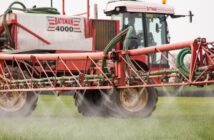Earth observation data from satellites and drones promise support for hard-pressed farmers in Colombia who are seeking to improve the viability of the country’s agriculture.
An ambitious collaboration project to harness space technology and bring sustainable productivity to rice and oil palm farmers in Colombia entered a crucial phase this month with the start of technical training workshops in Cali, the country’s second largest city and Pacific gateway.
Fewer than one in ten of Colombian farmers currently have access to technical assistance to help them to manage their land more efficiently at a time when the country sees agriculture as making a significant contribution to diversifying the country’s economy and reducing inequalities.
“Moreover, Colombia’s agriculture is subject to challenges from climate change,” says John Crawford, who heads the Integrated Solutions Lab at Rothamsted Research, which is leading the project. “So, productivity increases have also to be met against the threat of weather extremes.”
The new project, known as EcoProMIS (Ecological Production Management Information System), is designed to create a commercially viable solution for sustainable agriculture in Colombia by April 2021; a solution that is free to farmers and funded by industrial stakeholders.
EcoProMIS aims to combine space data with in-situ observations from smart sensors and to deliver that information to farmers in near real-time and in a way that enables them to increase productivity and minimise the environmental footprints of their oil palm and rice crops.
“Through outreach programmes, smallholders and land managers will develop their skills and understanding of how crop management affects productivity, income and ecosystems,” says Mr Crawford. “Smartphones will communicate data and knowledge directly from and to farmers in the field.”
He adds: “The system will also allow risk to be better managed and monitored, making it easier to provide financial services, such as loans and insurance, in a country where the vast majority of farmers cannot access these services.”
The 38-month project is supported by a grant of £3.9M from the UK Space Agency, under the second call of its International Partnership Programme. The IPP, a £152 million fund launched in 2015, uses UK organisations’ space knowledge, expertise and capability to provide a sustainable, economic or societal benefit to undeveloped nations and developing economies.
Eleven projects won support in this second round, IPP2, and join 22 existing projects. All IPP projects are match-funded, with consortium members and international partners providing further funding or contributions in kind.
“This exciting project in Colombia will help farmers to improve their land management to diversify the country’s economy and stabilise food supplies,” says Graham Turnock, chief executive of UK Space Agency. “Innovations from space, like Rothamsted’s EcoProMis, have the ability to expand skills and technology at home whilst bringing benefits abroad; I’m delighted to see this project progressing.”
Rothamsted signed the contract with the UK Space Agency in February, and then appointed Agricompas, a data analytics company based in the UK, to jointly forge and manage a public-private partnership, which was established in mid-May.
While Rothamsted excels in project management and crop science, Agricompas is experienced in analysing data to develop services that support decision making, notes Roelof Kramer, the company’s chief executive.
At the end of the project, Agricompas will own all the resulting intellectual property that it will be able to commercialise in Colombia and elsewhere in the world: “Revenues, crucial for the system’s maintenance, will be generated from services to processors, financial institutions and governments,” says Mr Kramer.
Rothamsted’s partners also include, from the UK, Elastacloud, for data science, and Pixalytics, for satellite earth observation; from Colombia, the International Centre for Tropical Agriculture (CIAT), Cenipalma and Fedearroz, for local agricultural knowledge; and Solidaridad, the international organisation behind the Fair Trade movement, for socio-economic expertise.
“We are very proud to bring public and private partners together in a holistic approach that improves crop productivity while it reduces environmental impact and improves socio-economic conditions of the stakeholders,” says Mr Kramer.




